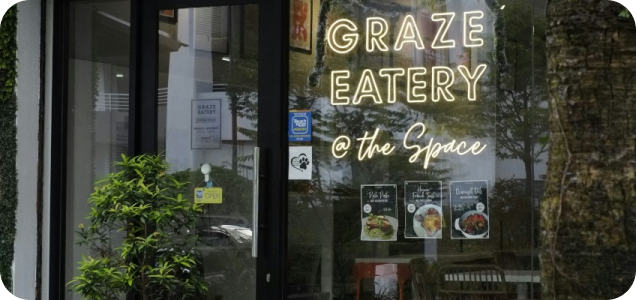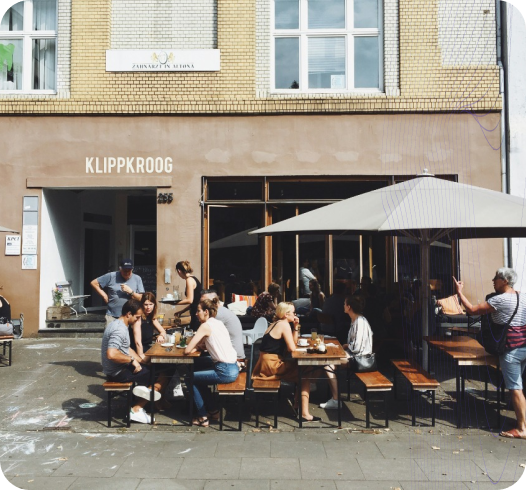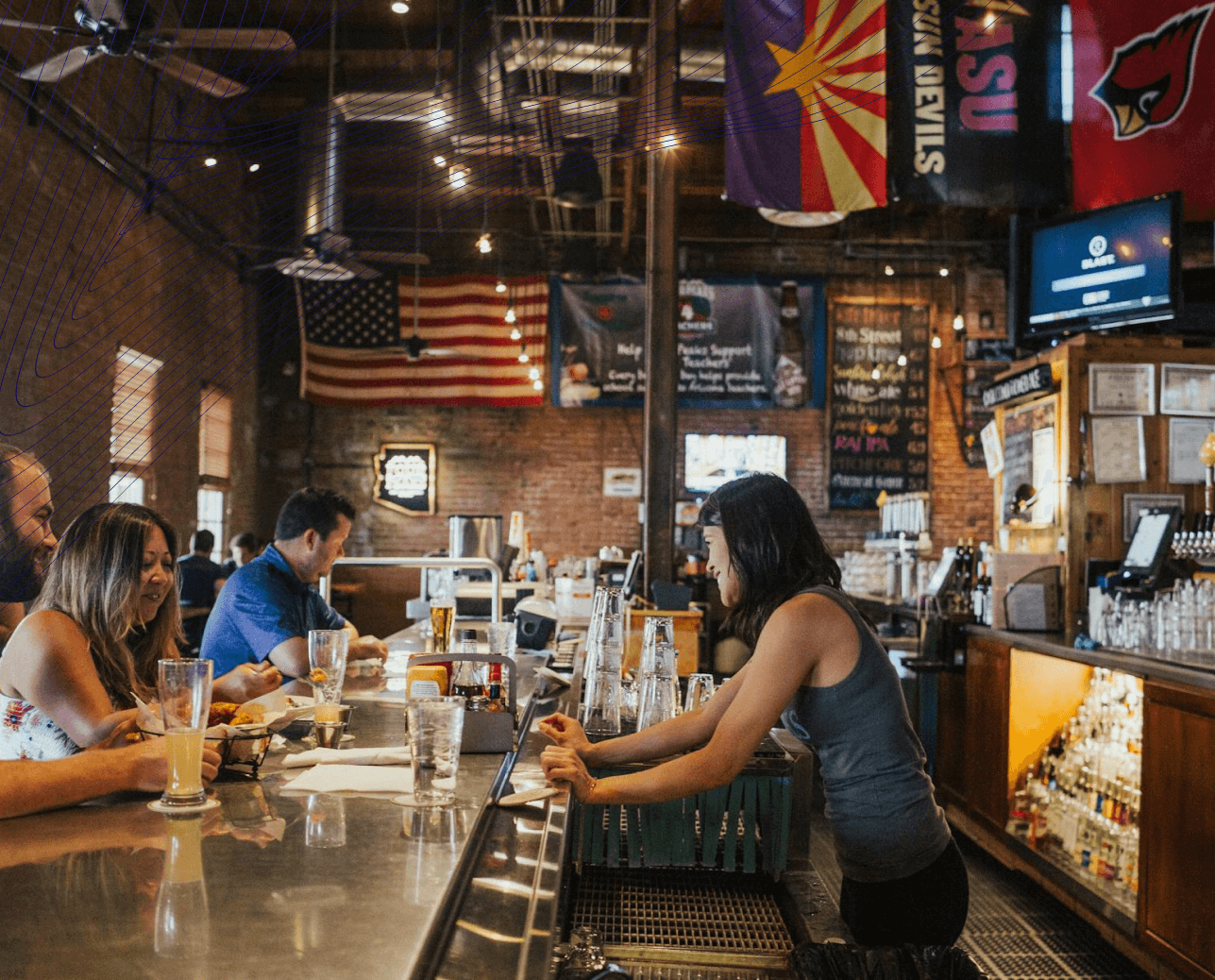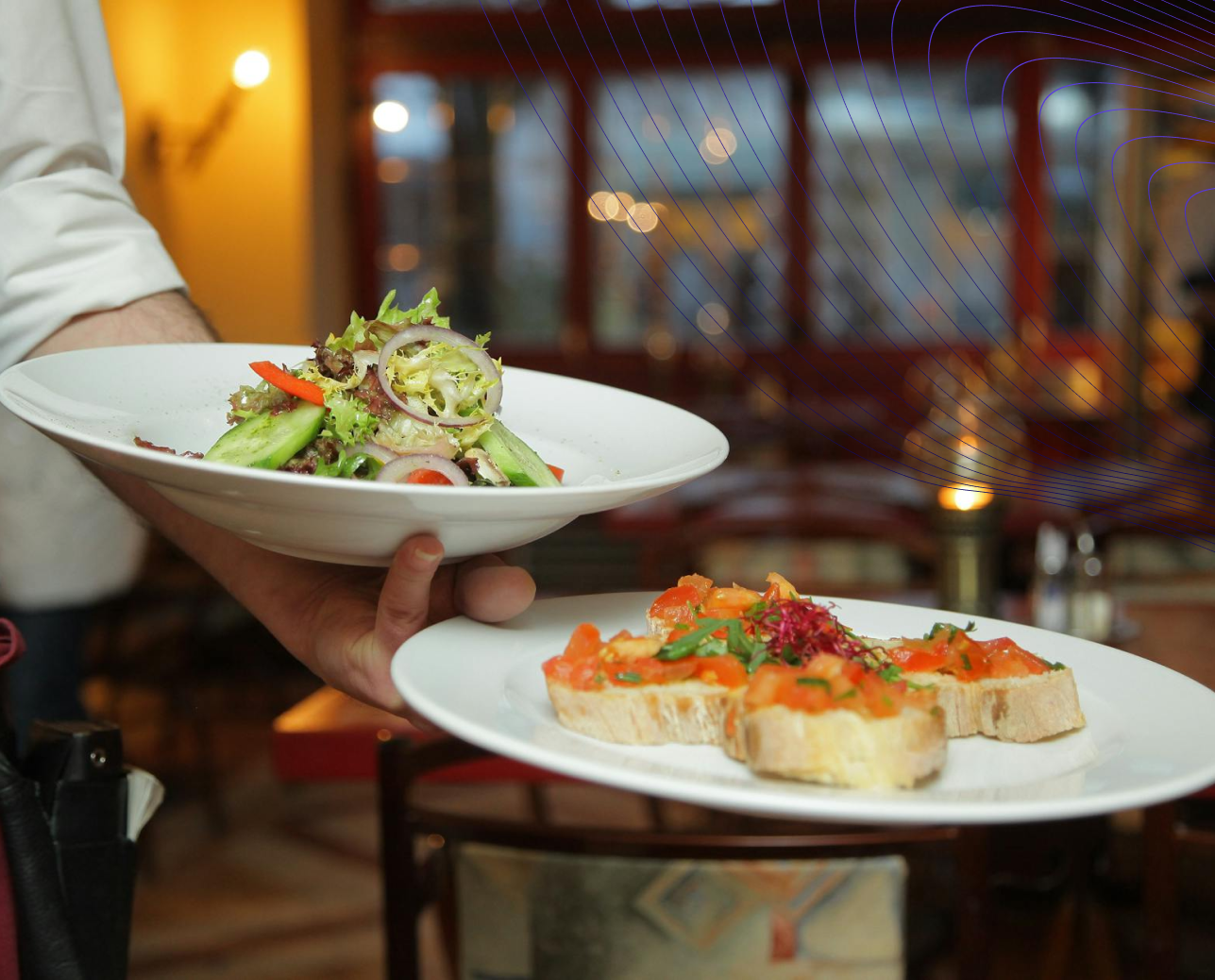How to Name a Restaurant?
This guide will walk you through the essential steps to choosing awesome names for restaurants, ensuring they resonate with your target audience and stand out in a competitive market. Whether you're opening a cozy café, a gourmet bistro, or a trendy food truck, this comprehensive guide will help you navigate the process of finding a name that truly represents your vision and appeals to your customers.

The Importance of Naming a Restaurant
Learn why creating a restaurant name is a critical first impression and how it contributes to your branding and legal considerations.

First Impressions Matter
A unique name for a restaurant is often the first interaction potential customers have with your business. It can attract or deter them based on the initial impression it creates. A compelling name can intrigue and invite customers to explore further, while a bland or confusing name may lead them to look elsewhere.
For example, consider the difference between a name like "The Gourmet Bistro" versus "Eatery X." The former evokes a sense of sophistication and culinary expertise, while the latter is vague and unremarkable. Your name should immediately give potential customers an idea of what to expect and entice them to experience your offering.
A strong first impression is crucial in the restaurant industry, where competition is fierce and customers have numerous options. Your name should be memorable, evoke curiosity, and invite potential patrons to step inside and experience what you have to offer. It's the first step in creating a lasting relationship with your customers.

Branding and Identity
Cool restaurant names reflect your restaurant’s theme and brand identity. It sets the tone for the dining experience and conveys your unique selling proposition. Whether you’re aiming for elegance, fun, or authenticity, your name should align with these attributes to reinforce your brand message.
For instance, a name like "La Trattoria" suggests a cozy, authentic Italian dining experience, while "Burger Barn" implies a casual, fun place for hearty, American-style burgers. The name should resonate with the ambiance you wish to create and the type of customers you want to attract.
Branding goes beyond just a name; it encompasses the emotions and expectations associated with your restaurant. Your name is a foundational element of this brand identity, influencing everything from your logo and signage to your marketing materials and online presence. It should be unique, relevant, and capable of growing with your business.

Legal Considerations
Legal steps are crucial to ensure your restaurant name is unique and protected. This includes conducting trademark searches and securing domain names and social media handles. Failing to do so can lead to costly legal disputes and rebranding efforts later on.
Trademarking your name ensures that no other business can use it, protecting your brand's identity. Additionally, checking for domain availability is essential for establishing a strong online presence. Consistent social media handles across platforms also help in building a cohesive brand identity.
Ignoring legal considerations can have severe consequences, including legal battles and forced name changes that can confuse your customers and harm your reputation. It's worth investing time and resources into ensuring that your chosen name is legally sound from the start.
Brainstorming Restaurant Title Ideas
Explore creative strategies for generating unique and appealing restaurant name ideas that align with your concept and audience.

Reflect Your Cuisine and Theme
Choosing a name that hints at the type of food you serve and the dining experience you offer can help set customer expectations. For example:
-
Italian Delight: Suggests Italian cuisine.
-
Spice Route: Implies a variety of spicy dishes.
- The Green Bistro: Indicates a focus on vegetarian or healthy food.
Your restaurant's name should give a clear indication of the cuisine or theme, helping potential customers decide if it aligns with their dining preferences.
The name should evoke the sensory experiences of your restaurant, from the flavors of your dishes to the ambiance of your dining room. For example, a name like "Seaside Grille" might conjure images of fresh seafood and ocean views, while "Urban Eatery" suggests a modern, city-centric dining experience.

Consider Your Target Audience
Selecting a name that appeals to your desired customer demographic is essential. For instance, a name like “Gourmet Central” might attract food enthusiasts, while “Burger Haven” appeals to fast-food lovers. Understand who your customers are and what names might resonate with them.
Consider factors such as age, lifestyle, and dining preferences. A name that appeals to young, trendy diners might not resonate with an older, more traditional crowd. Tailoring your name to your target audience can significantly impact your restaurant's success.
Understanding your audience involves market research and customer profiling. Are you targeting families, young professionals, tourists, or food critics? Each group has different preferences and expectations, and your name should reflect and cater to these nuances.

Use Creative and Descriptive Words
Imaginative language can create an evocative restaurant name. Words that are playful, descriptive, or evoke a sense of place or tradition can be effective. Examples include:
-
“Savory Tales”: Conveys delicious food and storytelling.
-
“Rustic Feast”: Suggests a hearty, homely dining experience.
-
“Urban Crust”: Implies a modern, trendy pizza place.
Using creative words can make your restaurant name more memorable and intriguing, encouraging potential customers to visit.
Descriptive names can also hint at the unique aspects of your restaurant, such as a special cooking technique, a signature dish, or a historical connection. For example, "Charcoal Grill" immediately brings to mind grilled dishes, while "Vintage Vine" might suggest a wine-focused dining experience.

Avoid Common Pitfalls
Identify common naming mistakes and how to avoid them:
-
Overly Complicated Names: Simple is often better.
-
Names Too Similar to Competitors: Ensure your name is distinctive.
-
Hard-to-Pronounce Names: Make sure it’s easy to say and remember.
-
Negative Connotations: Avoid words with unintended negative meanings.
Avoiding these pitfalls can help you choose a name that is effective and avoids potential issues.
Complicated or obscure names can confuse customers and make it difficult for them to find or remember your restaurant. Similarly, names that are too similar to competitors can lead to brand confusion and legal troubles. Always consider the broader context of your market and aim for a name that stands out positively.
Name of restaurant ideas: Checking Availability
Ensure your chosen name is available and legally sound by following these crucial steps.

Step One: Domain Name Availability
Verify the availability of a matching domain name for your restaurant’s online presence. A strong online presence is vital for marketing and customer engagement. Tools like WHOIS can help check domain availability.
Having a website with a domain name that matches your restaurant name helps customers find you online easily. It also aids in building a consistent brand image across all platforms. Consider variations of your name in case your first choice is unavailable, but always aim for a name that is easy to remember and spell.

Step Two: Trademark Search
Conduct a thorough trademark search to avoid legal issues. This step ensures no other business holds the rights to your chosen name, which could lead to legal complications.
A trademark search can be done through national databases like the United States Patent and Trademark Office (USPTO) or international databases if you plan to expand globally. This step is crucial to protect your brand and avoid potential lawsuits that could arise from using a name that is already trademarked.

Step Three: Social Media Handles
Check for consistent social media handles to maintain a cohesive online identity. Consistency across platforms makes it easier for customers to find and engage with your brand.
Social media is a powerful tool for marketing and customer interaction. Ensuring that your restaurant name is available as a handle on popular platforms like Instagram, Facebook, and Twitter helps in maintaining brand consistency and enhances your visibility.

Step Four: Legal Registration
Once you've confirmed the availability and conducted a trademark search, proceed with the legal registration of your business name. This involves registering with your local business authority, which provides you with the exclusive rights to operate under your chosen name in your jurisdiction.
Registering your name legally not only protects your brand but also gives you the credibility and legitimacy that customers look for. It ensures that your business operations are recognized by law and can help in securing financing and partnerships.
Testing Your Name For the Restaurant
Validate your restaurant name ideas through feedback and testing to ensure they resonate with your audience.

Gathering Feedback from Potential Customers
Methods for obtaining feedback on your name choices from your target market include:
-
Informal Surveys: .Ask friends, family, and potential customers for their opinions.
-
Online Polls: Use social media or your website to gauge interest.
Gathering feedback from a diverse group can provide insights into how different people perceive your name. This can help you refine your options and choose a name that appeals to the widest audience possible.

Conducting Surveys and Focus Groups
Learn how to use surveys and focus groups to gather opinions on potential names. These methods provide deeper insights into customer preferences and perceptions.
Surveys can be conducted online or in person, while focus groups offer a more interactive way to get detailed feedback. Ask participants what they think of each name, how it makes them feel, and what type of restaurant they would expect it to be.

Testing for Pronunciation and Memorability
Ensure your restaurant name is easy to pronounce and remember. Test it out by saying it aloud to different people and see if they can recall it later.
A name that is easy to pronounce and memorable is more likely to stick in customers' minds. Conducting tests can help you identify any potential issues with pronunciation or recall, allowing you to make necessary adjustments before finalizing your name.

Analyzing Feedback
Once you have gathered feedback, analyze the responses to identify common themes and preferences. Look for patterns in the data that indicate which names are most liked and why. This analysis can help you narrow down your options and choose a name that has broad appeal.

Refining Your Options
Based on the feedback and analysis, refine your list of potential names. Consider making slight adjustments to improve the names that received positive feedback but had minor issues. This iterative process ensures that you end up with a name that is well-received and effective.
Finalizing Your Restaurant Name Idea
Refine and finalize your restaurant name by aligning it with your brand vision and ensuring its practicality.

Aligning with Your Brand Vision
Make sure your name reflects your overall brand and mission. It should encapsulate the essence of what your restaurant stands for and aims to deliver.
Your brand vision includes your restaurant's values, goals, and the experience you want to provide. Your name should be a natural extension of this vision, helping to communicate it to your customers and reinforcing it through every interaction.

Ensuring Practicality and Longevity
Choose a name that will stand the test of time and remain relevant. Avoid trendy names that may become outdated.
A timeless name can help ensure that your brand remains relevant and appealing for years to come. Consider how your name will evolve with your restaurant and whether it will still be appropriate if you expand or change your menu offerings.

Getting Professional Help if Needed
Consider consulting branding experts for additional guidance. Professionals can provide valuable insights and help avoid common pitfalls.
Branding experts can offer a fresh perspective and bring their experience to the table, helping you navigate the complexities of naming your restaurant. They can assist with everything from brainstorming ideas to conducting market research and ensuring legal compliance.
Launching with a Good Name for a Restaurant
Effectively launch your restaurant with a well-planned marketing strategy and proper updates to legal documents and signage.

Marketing and Promotion
Use strategic marketing to promote your new restaurant name. This can include:
-
Social Media Campaigns: Engage with your audience through exciting announcements.
-
Press Releases: Inform local media and food bloggers about your launch.
-
Promotional Events: Host an opening event to create buzz.
A successful launch requires a well-coordinated marketing plan. Utilize various channels to reach your target audience and build excitement around your new restaurant. Offering special promotions or events can help attract initial customers and generate word-of-mouth buzz.

Updating Legal Documents and Signage
Ensure all legal documents and physical signs reflect your new name. This includes business licenses, contracts, menus, and storefront signage.
Consistency in your branding is crucial for establishing a professional image. Update all official documents, marketing materials, and physical signage to reflect your new name, ensuring there is no confusion among customers or regulatory bodies.

Announcing to the Public
Plan a grand opening or announcement event to introduce your restaurant name. Make it an occasion that attracts attention and draws in potential customers.
A grand opening event can be a powerful way to generate interest and excitement. Consider partnering with local media, influencers, or community organizations to maximize your reach. Offering samples, discounts, or entertainment can also make the event more attractive to potential customers.

Leveraging Online Presence
Maximize your online presence by updating your website, social media profiles, and online directories with your new name. Ensure that all digital touchpoints reflect your new branding, making it easy for customers to find and engage with your restaurant.
Smooth Start is Beyond the Name of a Restaurant
Utilize technology like ME-POS to streamline operations and enhance customer interaction, aiding in a successful restaurant launch. Key benefits include:
-
Sales Automation: Simplifies transaction processes, reducing wait times and improving customer satisfaction.
-
Resource Management: Efficiently handles inventory and supplies, ensuring you never run out of essential items.
-
Personnel Management: Tracks employee performance and schedules, helping you optimize staffing levels and enhance productivity.
By leveraging a POS system for restaurants, you can focus more on delivering exceptional dining experiences and less on administrative tasks.


Conclusion
Restaurant naming is a critical and multifaceted task that requires careful thought and consideration. Great names for a restaurant not only capture the essence of your brand and the experience you offer but also resonate with your target audience and stand the test of time.
By understanding the importance of a strong first impression, aligning your name with your brand identity, navigating legal considerations, and creatively brainstorming and testing your ideas, you can find unique restaurant name ideas that truly embody your restaurant's spirit.
Furthermore, ensuring the availability and legal protection of your nice name for a restaurant, gathering and analyzing feedback, and leveraging technology like ME-POS will support a smooth and successful launch. With a thoughtful and strategic approach, you can choose a restaurant name that will help your restaurant thrive in a competitive market.
Embark on your naming journey with confidence, knowing that the perfect food restaurant name is within reach. May your chosen name become synonymous with great food, exceptional service, and unforgettable dining experiences.
Was This Article Helpful?
Click on a star to rate it!
Thank you for your vote!

Average Rating: 5/5 Votes: 1
Be the first to rate this post!
View more
Related Articles
How to Open a Coffee Shop?
Opening a coffee bar can be a rewarding business venture, combining the love of coffee with the opportunity to create a community space. This comprehe...
How to Open a Bakery?
This guide will walk you through the essential steps to open a bakery shop, from initial planning to the grand opening. Whether you’re a first-time en...
The Ultimate Guide to Restaurant Promotion Ideas: Boost Your Business
Effective promotion strategies are crucial for the success of any restaurant. This comprehensive guide is designed to help restaurant owners and manag...
How to Open a Nails Salon: 18 Tips for Success
Starting a nail salon business is an exciting venture that requires careful planning and preparation. The foundation of a successful nail salon lies i...
20 Tips to Choose the Best Accounting Software for Small Businesses
Choosing the best small business software accounting can be a daunting task, given the multitude of options available in the market. The right softwar...
How to Open a Hair Salon: A Comprehensive Startup Guide
Starting a hair salon can be an exciting and rewarding venture. This comprehensive guide aims to provide you with information on how to open a hairdre...
Licenses and Permits Needed to Open a Restaurant
Opening a restaurant is an exciting yet challenging endeavor that requires more than just a great concept and a mouth-watering menu. Among the first a...
A Comprehensive Guide on How to Start a Small Business Successfully
So, you’re thinking about starting up a small business? That’s awesome! Whether you’re doing it for personal fulfillment, to escape the 9-to-5 grind, ...
CRM for Service Industry 2026: 7 Essential Features Your Business Needs
In 2026, customer expectations are higher than ever. Clients want seamless communication, personalized experiences, fast service, and easy booking — a...
How to Open a Beauty Salon and How Much Does it Cost?
Opening a beauty salon is an exciting venture that requires careful planning, research, and a clear understanding of the costs involved. Proper planni...
How to Open a Coffee Shop?
Opening a coffee bar can be a rewarding business venture, combining the love of coffee with the opportunity to create a community space. This comprehe...
How to Open a Bakery?
This guide will walk you through the essential steps to open a bakery shop, from initial planning to the grand opening. Whether you’re a first-time en...
The Ultimate Guide to Restaurant Promotion Ideas: Boost Your Business
Effective promotion strategies are crucial for the success of any restaurant. This comprehensive guide is designed to help restaurant owners and manag...
How to Open a Nails Salon: 18 Tips for Success
Starting a nail salon business is an exciting venture that requires careful planning and preparation. The foundation of a successful nail salon lies i...
20 Tips to Choose the Best Accounting Software for Small Businesses
Choosing the best small business software accounting can be a daunting task, given the multitude of options available in the market. The right softwar...
How to Open a Hair Salon: A Comprehensive Startup Guide
Starting a hair salon can be an exciting and rewarding venture. This comprehensive guide aims to provide you with information on how to open a hairdre...
Licenses and Permits Needed to Open a Restaurant
Opening a restaurant is an exciting yet challenging endeavor that requires more than just a great concept and a mouth-watering menu. Among the first a...
A Comprehensive Guide on How to Start a Small Business Successfully
So, you’re thinking about starting up a small business? That’s awesome! Whether you’re doing it for personal fulfillment, to escape the 9-to-5 grind, ...
CRM for Service Industry 2026: 7 Essential Features Your Business Needs
In 2026, customer expectations are higher than ever. Clients want seamless communication, personalized experiences, fast service, and easy booking — a...
How to Open a Beauty Salon and How Much Does it Cost?
Opening a beauty salon is an exciting venture that requires careful planning, research, and a clear understanding of the costs involved. Proper planni...
View more










































